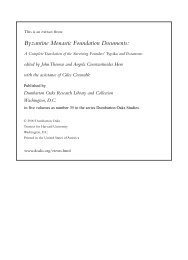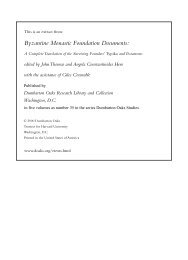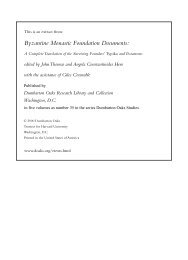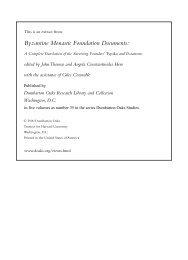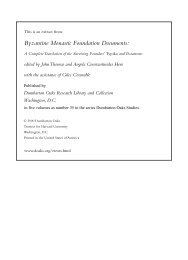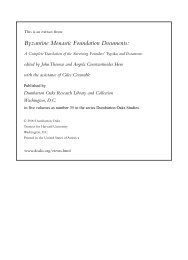Changing Economic Patterns in Latin Romania - Dumbarton Oaks
Changing Economic Patterns in Latin Romania - Dumbarton Oaks
Changing Economic Patterns in Latin Romania - Dumbarton Oaks
You also want an ePaper? Increase the reach of your titles
YUMPU automatically turns print PDFs into web optimized ePapers that Google loves.
David Jacoby [229]<br />
the pivotal location of Lat<strong>in</strong> <strong>Romania</strong> with<strong>in</strong> the triangular trade network. 196 The seaborne<br />
trade of Lat<strong>in</strong> <strong>Romania</strong> became subord<strong>in</strong>ated to the requirements, routes, and<br />
seasonal rhythm of long-distance maritime trade, <strong>in</strong>creas<strong>in</strong>gly dom<strong>in</strong>ated by Venetian<br />
merchants and carriers who took advantage of Venice’s naval and diplomatic protection<br />
and of the <strong>in</strong>frastructure offered by its colonies and commercial outposts. Short-distance<br />
trade and shipp<strong>in</strong>g, carried out with small vessels often practic<strong>in</strong>g cabotage, were partly<br />
redirected <strong>in</strong> order to convey goods collected <strong>in</strong> Lat<strong>in</strong> <strong>Romania</strong> and neighbor<strong>in</strong>g regions<br />
to the ma<strong>in</strong> ports <strong>in</strong>serted with<strong>in</strong> the trans-Mediterranean traffic. These same ships also<br />
took charge of the diffusion of imported goods.<br />
While the functions of the major transit ports have drawn some attention, their contribution<br />
to the economy of Lat<strong>in</strong> <strong>Romania</strong> itself has been largely overlooked and underestimated.<br />
These ports offered <strong>in</strong>frastructures and services assist<strong>in</strong>g transit<strong>in</strong>g merchants,<br />
ships, and goods. 197 Storage and transshipment, the supply of provisions, ship ma<strong>in</strong>tenance<br />
and repairs performed by qualified craftsmen, as well as money chang<strong>in</strong>g and<br />
bank<strong>in</strong>g provided substantial <strong>in</strong>fusions of cash. The sail<strong>in</strong>g of ships engaged <strong>in</strong> surveillance<br />
and the protection of convoys, naval warfare, piracy, and the recruitment of sailors,<br />
archers and crossbowmen, the latter especially <strong>in</strong> Crete, had similar effects. 198 To these<br />
we may add the build<strong>in</strong>g and enlargement of arsenals, as <strong>in</strong> Coron, Modon, Negroponte,<br />
and Candia, as well as repeated improvements <strong>in</strong> harbors that, although not always successful,<br />
ensured a flow of public money collected as taxes back <strong>in</strong>to the local economy,<br />
<strong>in</strong>stead of be<strong>in</strong>g siphoned off to Venice. 199 There is yet another function of transit ports<br />
that should be underl<strong>in</strong>ed. In addition to handl<strong>in</strong>g pass<strong>in</strong>g goods, resident merchants also<br />
served as middlemen <strong>in</strong> complex trade ventures between several regions. The function of<br />
<strong>in</strong>termediaries was particularly important <strong>in</strong> Crete. 200 All these activities generated profits,<br />
which were re<strong>in</strong>vested <strong>in</strong> Lat<strong>in</strong> <strong>Romania</strong>’s own economy, whether <strong>in</strong> the rural sector,<br />
<strong>in</strong> trade, or <strong>in</strong> transportation.<br />
Greeks are clearly underrepresented <strong>in</strong> the extant, overwhelm<strong>in</strong>gly Western documentation<br />
bear<strong>in</strong>g on Lat<strong>in</strong> <strong>Romania</strong>. The bias is less acute with respect to Venetian<br />
Crete beg<strong>in</strong>n<strong>in</strong>g <strong>in</strong> the fourteenth century, <strong>in</strong> view of the large number of notarial deeds<br />
referr<strong>in</strong>g to Greeks. It is nevertheless impossible to arrive at a fair evaluation, let alone a<br />
quantitative assessment of the Greek share <strong>in</strong> the region’s economy, dom<strong>in</strong>ated by the<br />
196 The co<strong>in</strong>s are recorded <strong>in</strong> numerous annual reports of the excavations, published <strong>in</strong> the 1990s <strong>in</strong> Hesp.<br />
For the conta<strong>in</strong>ers, see C. K. Williams II and O. H. Zervos, “Frankish Cor<strong>in</strong>th: 1994,” Hesp 64 (1995):<br />
16–22.<br />
197 See F. Thiriet, “Candie, grande place marchande dans la première moitié du XVe siècle,” Krhtikà Croniká<br />
15–16 (1961–62): 343–47, repr. <strong>in</strong> idem, Etudes, no. ix.<br />
198 On Crete <strong>in</strong> the Venetian naval defense system, see Thiriet, Romanie, 243–51; D. Jacoby, “Les gens de<br />
mer dans la mar<strong>in</strong>e de guerre vénitienne de la mer Egée aux XIVe et XVe siècles,” <strong>in</strong> Le genti del Mare Mediterraneo<br />
(XVII Colloquio <strong>in</strong>ternazionale di storia marittima, Napoli, 1980), ed. R. Ragosta (Naples, 1981), 1:172–74,<br />
repr. <strong>in</strong> idem, Studies, no. xi; Jacoby, “Creta,” 103–5.<br />
199 On work <strong>in</strong> harbors, see Hodgetts, “Colonies,” 146–51; R. Gertwagen, “The Venetian Port of Candia,<br />
Crete (1299–1363): Construction and Ma<strong>in</strong>tenance,” Mediterranean Historical Review 3 (1988): 141–58; eadem,<br />
“L’isola di Creta e i suoi porti (dalla f<strong>in</strong>e del XII alla f<strong>in</strong>e del XV secolo),” <strong>in</strong> Ortalli, Venezia e Creta (as above,<br />
note 68), 350–74; F. Thiriet, “Réthimo et son district au qu<strong>in</strong>zième siècle,” <strong>in</strong> Pepragména tou' G Dieqnou'"<br />
Krhtologikou' Sunedríou, vol. 2(Athens, 1974), 305–6, repr. <strong>in</strong> idem, Etudes, no. xvi.<br />
200 See Jacoby, “Creta,” 80–81, 83–84, 92–103, 105–6.




